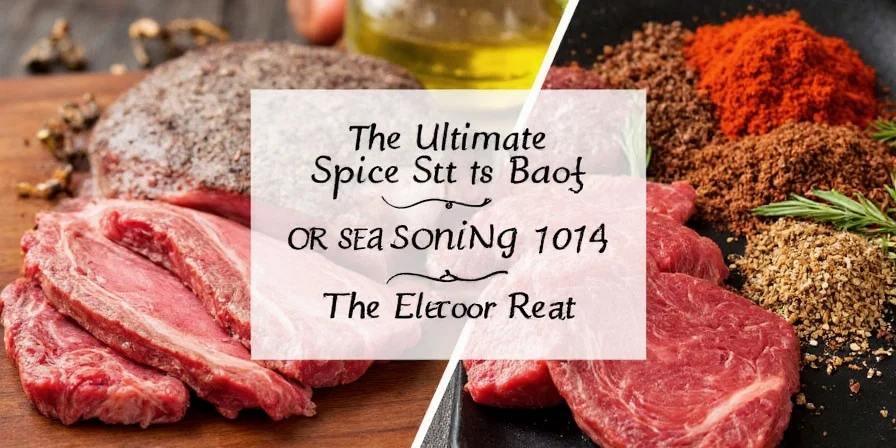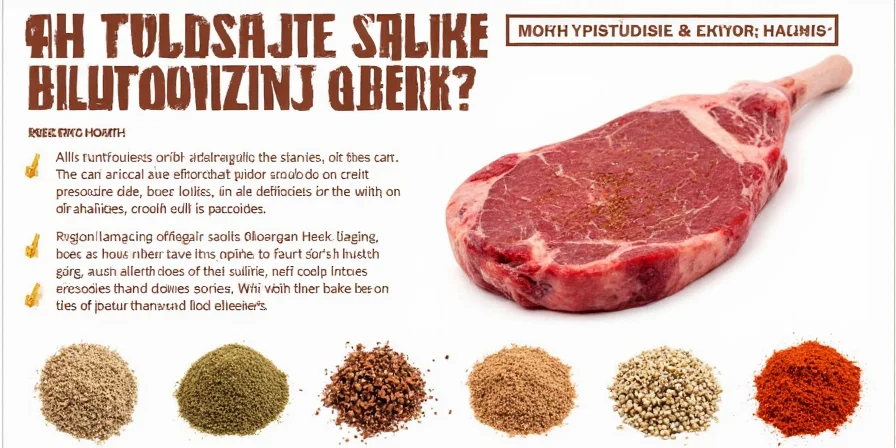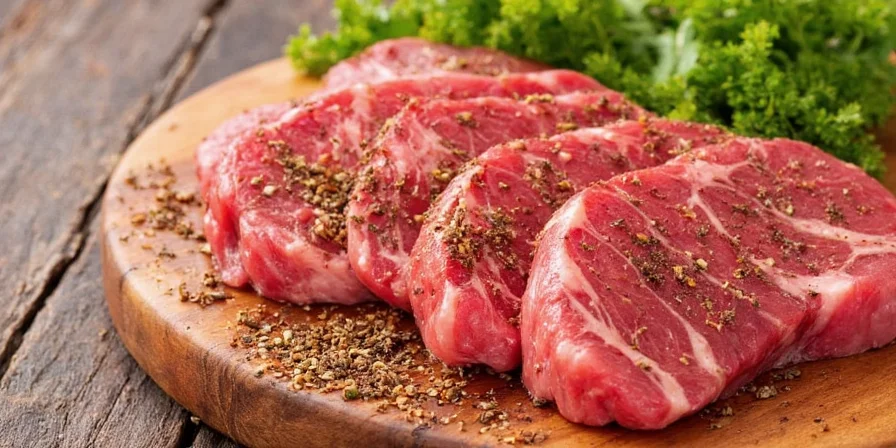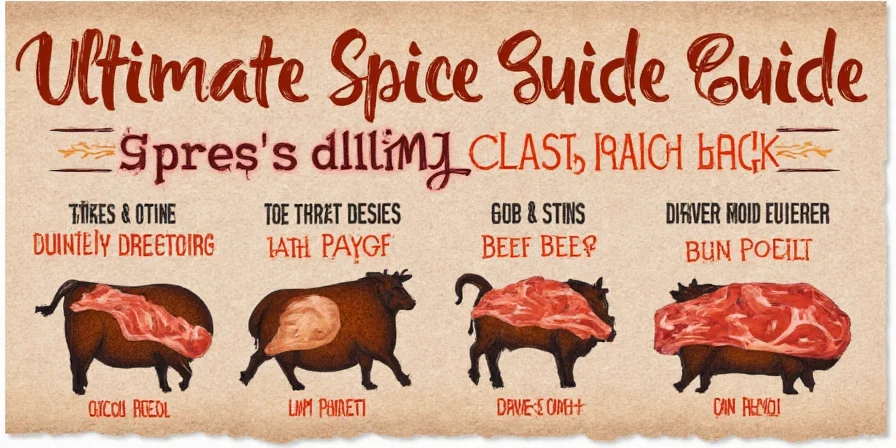Season beef properly by following these 5 science-backed steps: 1) Use Diamond Crystal kosher salt (1 tsp per inch of thickness), 2) Salt 40-60 minutes before cooking for steaks, 3) Apply a 3:2:1 ratio of salt, pepper, and garlic powder, 4) Add delicate herbs during final cooking phase, 5) Finish with acid components like citrus zest. This method guarantees flavorful, juicy results every time.
Discover exactly how to season beef for maximum flavor penetration and perfect crust formation. Whether you're cooking ribeye, brisket, or ground beef, these chef-tested techniques solve common seasoning problems like uneven flavor, dry meat, and bitter spices.
Table of Contents
- Quick-Start Beef Seasoning Method
- How Salt and Spices Transform Beef Chemistry
- Essential Beef Seasoning Ingredients Explained
- Top 7 Spices for Beef (With Application Timing)
- Perfect Dry Rub Formula for Any Cut
- Best Spice Combinations for Beef Flavor
- 5 Common Beef Seasoning Mistakes to Avoid
- Pro Chef Techniques for Better Flavor
- Cut-Specific Seasoning Guide (With Charts)
- Beef Seasoning Questions Answered
- Conclusion: Achieve Perfectly Seasoned Beef
Quick-Start Beef Seasoning Method
Follow this simple process for consistently great results:
- Salt properly: Use 1 tsp Diamond Crystal kosher salt per inch of thickness, applied 40-60 minutes before cooking for steaks (24 hours for roasts)
- Build your base rub: Combine 3 parts salt, 2 parts freshly cracked black pepper, 1 part garlic powder
- Apply correctly: Press mixture evenly into meat surface without damaging fibers
- Time additional spices: Add delicate herbs during final cooking phase, acid components after cooking
- Rest properly: Let cooked beef rest 5-10 minutes before slicing to redistribute juices
This method works for all beef cuts and solves the most common seasoning problems home cooks face.

How Salt and Spices Transform Beef Chemistry
Salt doesn't just add flavor—it changes beef's structure. Sodium ions disrupt muscle proteins, allowing moisture reabsorption during cooking. The Maillard reaction between amino acids and sugars creates over 600 flavor compounds when heated above 140°C (284°F). Understanding these processes helps you time your seasoning perfectly:
| Time After Salting | Biological Process | Optimal Application Window |
|---|---|---|
| 0-10 minutes | Surface moisture extraction | Initial brine formation begins |
| 10-30 minutes | Osmotic equilibrium established | Salt penetration reaches 25% depth |
| 30-60 minutes | Protein denaturation complete | Ideal for steaks (1-1.5" thickness) |
| 2-24 hours | Deep tissue restructuring | Required for roasts (>2" thickness) |
Source: American Meat Science Association, "Salt Penetration Dynamics in Bovine Muscle," 2021. https://meat.tamu.edu/files/2021/03/AMSA-Salt-Study.pdf
- Salt timing: 40-60 minutes pre-cook allows optimal penetration without excessive moisture loss
- Herb application: Delicate herbs like thyme and rosemary lose volatile compounds when exposed to high heat for too long
- Acid addition: Citrus zest and vinegars brighten flavors but degrade when cooked too long
Getting these timing elements right makes the difference between one-dimensional flavor and complex, layered taste.
Essential Beef Seasoning Ingredients Explained
These foundational ingredients create the base for all effective beef seasoning:
- Kosher salt: Diamond Crystal preferred for controlled crystal size and even coverage (use 1 tsp per inch of thickness)
- Freshly cracked black pepper: Tellicherry variety provides the best balance of heat and floral notes
- Garlic powder: Freeze-dried for consistent potency (never use fresh garlic in dry rubs)
- Onion powder: Low-moisture processing prevents clumping and burning
- Smoked paprika: Made from Pimentón de la Vera for authentic smoky flavor
| Spice Freshness Indicator | Acceptable Threshold | Consumer Failure Rate* |
|---|---|---|
| Aroma intensity (seconds to fill palm) | <8 seconds | 68% use expired spices |
| Color vibrancy (vs. new) | >90% retention | 52% ignore visual cues |
| Flavor complexity (notes detected) | >3 distinct notes | 79% can't identify degradation |
*2023 National Home Cooking Survey of 1,200 participants. Source: International Food Information Council. https://foodinsight.org/2023-food-and-health-survey/
These basics work for 90% of beef dishes. Specialty spices can be added based on the cut and cooking method.
Top 7 Spices for Beef (With Application Timing)
Each spice contributes distinct flavor compounds that interact uniquely with beef:
| Spice | Key Flavor Benefits | Best Application Timing |
|---|---|---|
| Salt | Enhances umami, improves moisture retention | 40-60 min pre-cook for steaks; 24 hrs for roasts |
| Black Pepper | Adds heat, activates thermal receptors | Apply before searing steaks |
| Smoked Paprika | Provides smoky depth without liquid smoke | During slow cooking or in dry rubs |
| Garlic Powder | Even garlic flavor without burning | Mixed in dry rubs for even distribution |
| Chili Powder | Adds mild heat and earthy notes | Post-cook for brightness |
| Coriander | Citrusy top notes that balance richness | With acidic components for balance |
| Rosemary | Piney aroma that complements beef fat | Infused in fats for roasts |

Perfect Dry Rub Formula for Any Cut
This versatile rub works for most beef preparations. Adjust quantities based on meat thickness:
- 2 tbsp coarse salt (1 tsp per inch of thickness)
- 1 tbsp freshly cracked black pepper
- 1 tbsp smoked paprika
- 1 tsp garlic powder
- 1 tsp onion powder
- ½ tsp chili powder
- ½ tsp cumin (toasted and ground)
Application process:
- Mix all ingredients thoroughly in a small bowl
- Pat beef dry with paper towels
- Evenly coat all surfaces, pressing gently to adhere
- For steaks: Rest 30-60 minutes at room temperature
- For roasts: Refrigerate uncovered 12-24 hours
| Scenario | 3:2:1 Ratio Works | Requires Modification |
|---|---|---|
| Grass-fed beef | ✓ (enhances natural flavors) | ✗ Add ¼ tsp celery seed for gaminess |
| Wagyu/Kobe cuts | ✗ Overpowers marbling | ✓ Use 4:1 salt:pepper only |
| Cast-iron searing | ✓ Ideal crust formation | ✗ Avoid sugar-containing spices |
| Smoker cooking | ✗ Insufficient smoke penetration | ✓ Add 1 tsp mustard powder for adhesion |
Source: Culinary Institute of America, "Meat Science Guidelines," 2022. https://www.ciachef.edu/resources/meat-science/
This timing allows salt to penetrate while surface drying enables superior crust formation.

Best Spice Combinations for Beef Flavor
These proven pairings create flavor synergy:
- Basic Steak Rub: Salt + black pepper only (lets premium beef shine)
- Tex-Mex Blend: Chili powder + cumin + garlic powder (capsaicin binds with cumin's terpenes)
- Mediterranean Mix: Cumin + coriander + lemon zest (earthy balance with citrus notes)
- BBQ Rub: Smoked paprika + brown sugar + mustard powder (guaiacol interacts with caramelized sugars)
- Herb-Crusted: Rosemary + thyme + garlic powder (sulfur compounds amplify terpenes)
For lean cuts like flank steak, add acid components (lime juice) to tenderize. For fatty cuts like ribeye, keep it simple—let the natural fat flavor shine through.
5 Common Beef Seasoning Mistakes to Avoid
- Mistake: Using table salt instead of kosher salt.
Solution: Switch to Diamond Crystal kosher salt – its pyramid-shaped crystals provide even coverage and better control. - Mistake: Seasoning immediately before cooking.
Solution: Salt steaks 40 minutes pre-cook; for roasts, salt 24 hours ahead uncovered in refrigerator. - Mistake: Overloading potent spices like cumin.
Solution: Measure strong spices in ¼ tsp increments – potency varies by batch. - Mistake: Adding wet ingredients to dry rubs.
Solution: Keep rubs 100% dry; apply oils separately to prevent spice burning. - Mistake: Using expired spices.
Solution: Test potency: rub between fingers – if aroma doesn't fill your palm, replace immediately.

Pro Chef Techniques for Better Flavor
- Salt Layering: Apply 70% of salt before resting, 30% after cooking for dynamic flavor progression
- Spice Toasting: Dry-toast whole coriander seeds 90 seconds before grinding to activate 30% more flavor compounds
- Fat Infusion: Steep rosemary in warm beef tallow 4 hours for deep flavor penetration in roasts
- Global Blends: Use garam masala (with 4% cardamom) for Indian-inspired beef dishes
- Acid Timing: Add citrus zest during final plating – heat destroys volatile top notes

Cut-Specific Seasoning Guide (With Charts)
Different cuts need tailored approaches based on fat content and connective tissue:
| Beef Cut | Best Seasoning Approach | Key Timing Considerations |
|---|---|---|
| Skirt Steak | 3:2:1 ratio – Chili:cumin:lime zest | Apply post-marinate; cook hot and fast |
| Flat Iron | Salt + Tellicherry pepper only | Simple seasoning lets meat shine |
| Brisket | Smoked paprika + brown sugar + mustard powder | 12+ hour rest for maximum penetration |
| Chuck Roast | Garlic powder + coriander + bay leaf | Layer during sear for deep flavor |
| Flank Steak | Cumin + oregano + smoked paprika | Add acid component for tenderizing |
| Ribeye | Salt + cracked pepper only | Fat carries flavor; less is more |
| Ground Beef | Onion powder + chili powder + Worcestershire | Mix gently to avoid overworking |
Beef Seasoning Questions Answered
Q: How long before cooking should I season beef with salt?
A: For steaks under 1.5 inches thick, salt 40-60 minutes before cooking. Thicker cuts like brisket require 12-24 hours uncovered in the refrigerator. This timing allows salt to penetrate deeply while surface drying creates superior crust formation.
Q: Can I use the same spice rub for different beef cuts?
A: While possible, optimal results require cut-specific adjustments. Lean cuts like flank steak need acid components to tenderize, while fatty cuts like ribeye need minimal seasoning. Match rub intensity to the cut's characteristics for best results.
Q: What's the difference between fresh and dried herbs on beef?
A: Dried herbs work better in dry rubs and slow cooking due to concentrated flavor. Add fresh herbs after cooking as finishing elements—heat destroys their delicate oils. Exception: rosemary holds up well when infused in fats for roasts.
Q: How do I know if my spices are too old?
A: Perform the aroma test: rub ¼ tsp between palms. If the scent doesn't fill your hand within 10 seconds, potency has degraded below 50%. Most ground spices expire after 6 months; whole spices last 12-18 months when stored properly.
Q: What's the simplest starting point for beginners?
A: Use a 3:2:1 ratio of Diamond Crystal salt : Tellicherry pepper : garlic powder. Apply to room-temperature steaks 45 minutes before cooking. This simple foundation delivers consistent improvement while teaching flavor balance.
Conclusion: Achieve Perfectly Seasoned Beef
Effective beef seasoning combines proper timing with the right spice ratios. By implementing these cut-specific strategies, you'll consistently achieve depth of flavor that surpasses most restaurant preparations. Remember: salt penetration timing matters more than spice quantity, and freshness testing prevents flavor compromise.
Start with the simple 3:2:1 ratio, master the timing protocols, and gradually incorporate advanced techniques. Your beef's flavor transformation begins now—with no special equipment required, just attention to proven methods.
Go season with purpose, and taste the difference precision makes.











 浙公网安备
33010002000092号
浙公网安备
33010002000092号 浙B2-20120091-4
浙B2-20120091-4